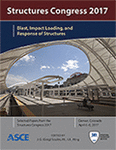Modeling and Testing of Shear Connections with Beams under Tension Membrane Loading
Publication: Structures Congress 2017
Abstract
Structural steel framing members subjected to blast loading respond initially in flexure followed by tension membrane as deflection increases. If member connections have been adequately designed and detailed, those members can achieve large deformations and achieve significantly greater load capacity in tension membrane than can be developed in flexure only. The applied load and large deformation of the member produce a tensile axial force that must be resisted by both the member and corresponding connections. With rigid connections, the normal-to-plane deformations cause elongation of the member. Even a small axial elongation along the component axis can produce significant tensile forces. If a portion of the axial deformation could be relieved by incorporating flexibility of the connections, the resulting axial force in the member and the force demand on the connections can be reduced. Moreover, similar concepts used while designing the component are required for the connection design such as: strength, stiffness, ductility, especially if a ductile failure mode in the component is expected. Ample research has been done to study semi-rigid connection behavior during conventional loading. However, there is limited research of connections for members subjected to blast and impact loading. Recently, the University of Alberta has performed research on the behavior of shear connections (SC) of structures subjected to progressive collapse loading. Although this research evaluated response with a lower strain rate effect than typically occurs with blast loading, the connection test data is valuable for model development. Currently, there is no comprehensive blast standard or guideline for design of connections in components subjected to blast load. This paper presents a multi-degree of freedom (MDOF) approach to compute the overall response of a steel member subjected to blast loading, including the component (with large deformation) and connections. Connection models proposed by the University of Alberta are incorporated in the MDOF tool. This MDOF approach can predict a more realistic response of the system subjected to blast loading than provided by typical single-degree-of-freedom (SDOF) approaches, which ignore connection flexibility.
Get full access to this article
View all available purchase options and get full access to this chapter.
Information & Authors
Information
Published In
Copyright
© 2017 American Society of Civil Engineers.
History
Published online: Apr 4, 2017
Authors
Metrics & Citations
Metrics
Citations
Download citation
If you have the appropriate software installed, you can download article citation data to the citation manager of your choice. Simply select your manager software from the list below and click Download.
